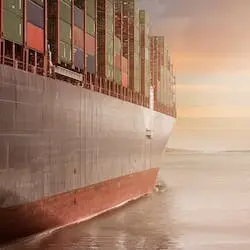
Level 1:
Big ships have a lot of problems now! Because of winter and holidays, ports in northern Europe are full. This makes ships wait a long time. Also, there are mean people threatening ships in the Red Sea. This makes them go a longer way around Africa, not through the Suez Canal. Big company Maersk says these problems might hurt their work at Europe and Hub ports.
The head of Maersk thinks these problems will last a few months. To help this, they will move containers in the air from Oman and the UAE. But this makes prices go high. Big ship problems are not going away soon!
Level 2:
Big shipping companies like Maersk are facing serious issues! Winter conditions and holidays have caused congestion in northern European ports. Ships have to wait longer because of the crowded terminals which slows down everything.
Moreover, they face threats from the Red Sea, which forces them to bypass the Suez Canal. Instead, they take a long way around Africa to avoid danger. These factors may have an impact on the operations of Maersk and other companies at Europe and Hub terminals.
The CEO of Maersk anticipates these disruptions to last a few months. To deal with delays, they’re considering air freight as an option for moving containers in Oman and the UAE. However, this solution is causing shipping rates to skyrocket. The challenges faced by these big ships are far from over!
Full Story:
Caught in the eye of the storm, big shipping companies, with Maersk leading the pack, are up against the wall. They are dealing with major operational hurdles that are throwing a wrench in their routine activities, taking a toll on the usual pace of their business. What’s adding to the fuel, you ask?
Firstly, adverse winter conditions coupled with holiday-related disruptions have swept across northern European ports. The ripple effect has led to congestion at container terminals with a staggering leap in transit times. Ports are overwhelmed, resulting in terminal closures and navigation stoppages. It’s a perfect storm of unfortunate circumstances that are causing these delays.
Secondly, the menace from the Red Sea. Ships have been targeted by Yemen’s Houthi rebels, causing serious security concerns for shipping companies. In a bid to stay out of harm’s way, these companies are bending over backwards to ensure safety, adopting longer routes around Africa, instead of shooting straight for the Suez Canal shortcut. This strategic shift in gear signifies added sailing days, further escalating congestion woes.
With these challenges in tow, Maersk has sent out a stern warning regarding potential ripple effects across Europe and Hub terminals. The CEO of Maersk paints a gloomy picture, anticipating that the disruptions stemming from Red Sea attacks could hold sway over operations for several months.
Trying to weather the storm, Maersk is leaving no stone unturned to circumvent the delays. They are pulling out all the stops and are offering customers the option to switch gears by shifting cargo to air freight in Oman and the UAE. Although this seems like a temporary fix, it’s causing the container shipping rates for major trade routes to go through the roof amid concerns of prolonged disruptions.
The road ahead is paved with uncertainties and operational challenges for big shipping companies, with the potential for these factors to throw a spanner in the works for global trade. With operational hurdles looming large, it’s clearly not smooth sailing for these big ships.
In a nutshell, these tumultuous conditions are a clear indication that the troubles for big ships like Maersk are far from over. The industry needs to brace itself for a bumpy ride with the hope to eventually navigate the rough waters and regain control of their operations.
Questions:
Question: Which shipping company is primarily affected by the current disruptions?
Answer: The shipping company primarily affected by the current disruptions is Maersk.
Question: What are the primary causes of the congestion at container terminals?
Answer: The primary causes of the congestion at container terminals are adverse winter conditions and holiday-related disruptions in northern Europe, and security threats in the Red Sea that have forced vessels to take longer routes around Africa.
Question: What does Maersk propose to alleviate some of the delays caused by these disruptions?
Answer: To deal with delays caused by these disruptions, Maersk proposes to move some cargo to air freight in Oman and the UAE.
Question: How has the redirection of vessels impacted shipping rates?
Answer: The redirection of vessels and the potential shift to air freight due to security threats and weather conditions have caused shipping rates to surge.
Question: How long does Maersk’s CEO anticipate these disruptions to persist?
Answer: The CEO of Maersk anticipates that these disruptions may persist for several months.
Fill in the Blanks:
up against the wall, taking a toll, staggering leap, perfect storm, harm’s way, shift in gear, paints a gloomy picture, hold sway, weather the storm, pulling out all the stops, switch gears, go through the roof, road ahead, throw a spanner in the works, looming large, brace itself, navigate the rough waters
Shipping companies are up against the wall with winter conditions and Red Sea threats.
These hurdles are taking a toll on their routine operations, with a staggering leap in transit times.
We’ve got a perfect storm of unfortunate circumstances causing these delays.
To stay out of harm’s way, companies are adopting longer routes around Africa, a major shift in gear.
Maersk CEO paints a gloomy picture, anticipating that these disruptions could hold sway over operations for several months.
Trying to weather the storm, Maersk is pulling out all the stops offering customers the option to switch gears to air freight.
However, this measure causes shipping rates to go through the roof amid prolonged disruption concerns.
The road ahead is filled with operational challenges that could potentially throw a spanner in the works for global trade.
With operational hurdles looming large, it’s not smooth sailing for the shipping industry.
The industry must brace itself for a bumpy ride, hoping to eventually navigate the rough waters and return to normal operations.
Vocabulary:
up against the wall - in a difficult situation with no easy solution.
taking a toll - causing harm or damage.
staggering leap - an astonishingly large or significant increase or jump.
perfect storm - a critical or disastrous situation created by powerful concurrence of factors.
harm’s way - in a dangerous situation.
shift in gear - a change in methods, direction, or course of action.
paint a gloomy picture - to describe a negative or unfavorable situation.
hold sway - to have a controlling influence.
weather the storm - to navigate through difficult times or crisis.
pulling out all the stops - to make all possible efforts to achieve something.
switch gears - to change one’s approach or strategy.
go through the roof - to increase or rise sharply.
road ahead - future events or prospects.
throw a spanner in the works - to do something that prevents a plan or activity from succeeding.
looming large - appearing as a large and unclear risk or difficulty.
brace oneself - to mentally or emotionally prepare oneself for something difficult or challenging.
navigate the rough waters - to deal with a difficult or complex situation.




